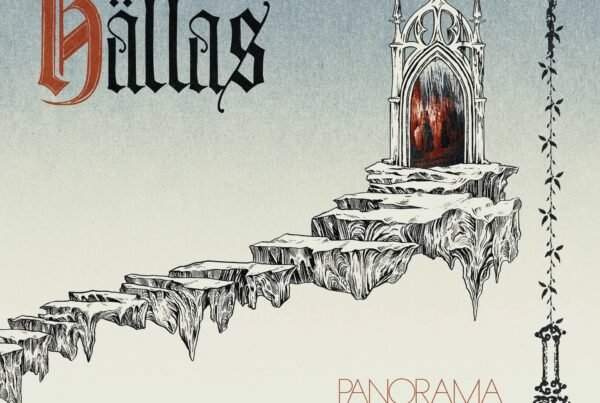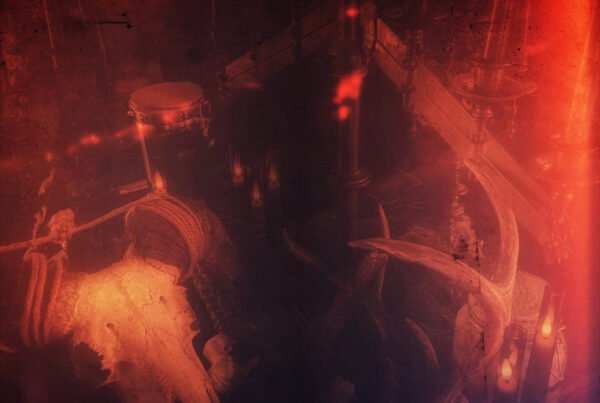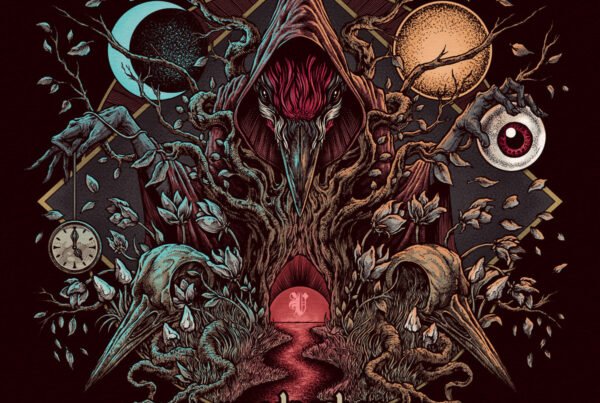A transmissive and ethereal journey that utilises modern jazz and folk music’s most enlightening traits to transport the listener into unchartered territory.
Release date: September 29, 2024 | Veego Records | Facebook | Bandcamp
Kolida Babo is the master work of Greek multi-instrumentalist duo Socratis Votskos and Harris P (aka Charidimos Pappas) who originate from two separate regions of the nation (Pella and Athens respectively). The artists implement several distinctive folk and electronic instruments, with Votskos undertaking mainly woodwind duties of clarinets and saxophones and Harris P on electronics and Moog/Roland synths. The duo also both experiment with a range of folk instruments such as the Armenian Duduk, Kaval, and Qanun. Kolida Babo’s sound can further be described as a spiritual and enriching application of modern electronica and free jazz that romanticises native folk culture through intricate textural layering and nuance. Their self-titled album was recorded over three years as live-take sessions that celebrated the folk rituals of Armenian and Northern Greek culture in the Epirus and Thrace regions. Imbuing a sense of locality that delves into the transcendence of musical tradition, Kolida Babo continue to push avant-garde boundaries with sounds that ripple through Greece’s sociocultural and economic concerns in ways that guide the listener on a spiritual journey with their second album Spirits of Mauronoros.
The opening track, “Anthony Joseph Sciacca”, appears as a homage to revered American bebop clarinettist Tony Scott. The track heavily utilises woodwind instrumentation in a wholly improvisational fashion that not only honours the late jazz musician’s great fondness of Asiatic tonal harmonies, but also proves a developmental piece that gradually exports layers of free microtonal jazz and futuristic sound design. The remainder of the record continues this improvisational and experimental approach that acts as a spiritual journey dedicated to the village Mauronoros (which roughly translates to ‘Black Mountain’), and the people who reside within this region facing socio-cultural and geographic alienation due to Greece’s economic crisis within the last century. “Pangea’s Journey” expounds a ritualistic presence through tribalistic percussive rhythms behind a blend of authentic folk melodies that bounce off one another, finding moments in the track to really connect with each other.
“Exiles in Aegean” heavily infuses Middle Eastern-style harmonies over alluring synthesised textures to formulate this hypnotic, desert kind of atmosphere. The wind instrumentation exhibits a steady series of notes over 1950s-style electro-acoustic textures to convey somewhat futuristic leanings of Asian folk traditions resonant of the avant-garde methods investigated by the likes of Cage or Schaffer. “Hymn” continues this placement of traditional Asian harmony and folk tradition further, whilst appearing to come over as a rather secular piece, perhaps to find some historic significance of these traditional sounds and their importance in modern Greek culture, tying together the old and new.
Entering more experimental territory, “Entering Cassiopeia” commences with a simple series of arpeggiated rhythms that again calls back to the avant-garde leanings of 1950’s and 60’s minimalism. The electronic incorporation proves to be a powerful tool in transporting the listener into outlandish sonic realms, leaving space for the ear to explore a palate of sonic depth and displacement. “Free For All”, by comparison, comes across fairly more grounded in its rhythmic foundation (at least at first), yet an array of free formulated jazz elements entice the piece, shifting the dynamics and delivering moments of intense and astonished amusement.
The title track puts more emphasis on elevating the folk instrumentation onto a higher platform; the hard bop style of the saxophones and the countermelodies on top have an extremely transcendental allure that delivers some of the album’s most mystical and captivatingly authentic moments. The closing track, “Kolida Balkanesque”, continues the frantic free jazz melodic improvisation in a work of pure virtuosic delivery, coupled with native resonances and melodies of a cathartic past. Listen to the final moments of this track as the crescendos of electronics, jazz improv, and ancient harmonies dance around each other in ritualistic harmony.
In a place devoid of space and time, an enlightening and thought-provoking journey awaits the listener with this record. With great experimental and avant-garde depth, Spirit of Mauronoros utilises a range of polar opposites from complexity to minimalism, electro-futurism to ancient folk traditionalism, and places these musical traits in such a way that they are complemented by their grandeur. A retelling of the old world and the Greek traditions often understudied by the average listener, Socratis Votskos and Harris P convey a transcendent and spiritual piece of sonic craft that connects free jazz improvisations, tribalistic rhythms, antique melodic passages, and electro-acoustic minimalism in such a powerfully enlightening and cathartic manner that truly allows one to resonate with the authenticity of the artist’s surroundings.






